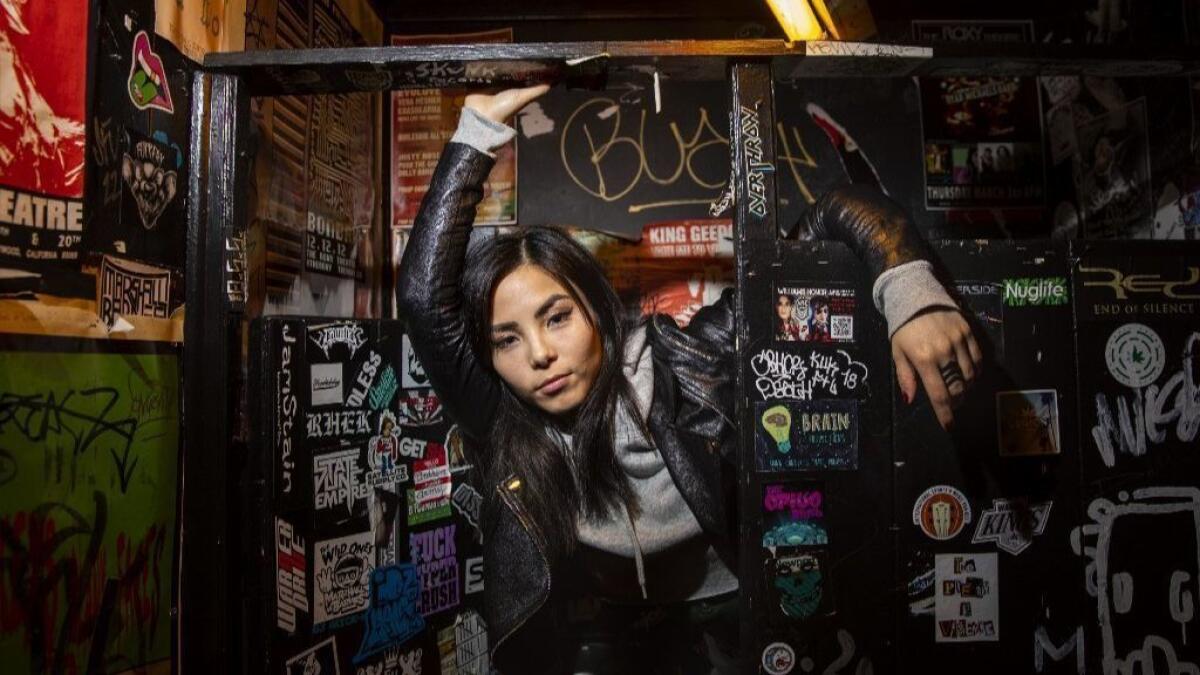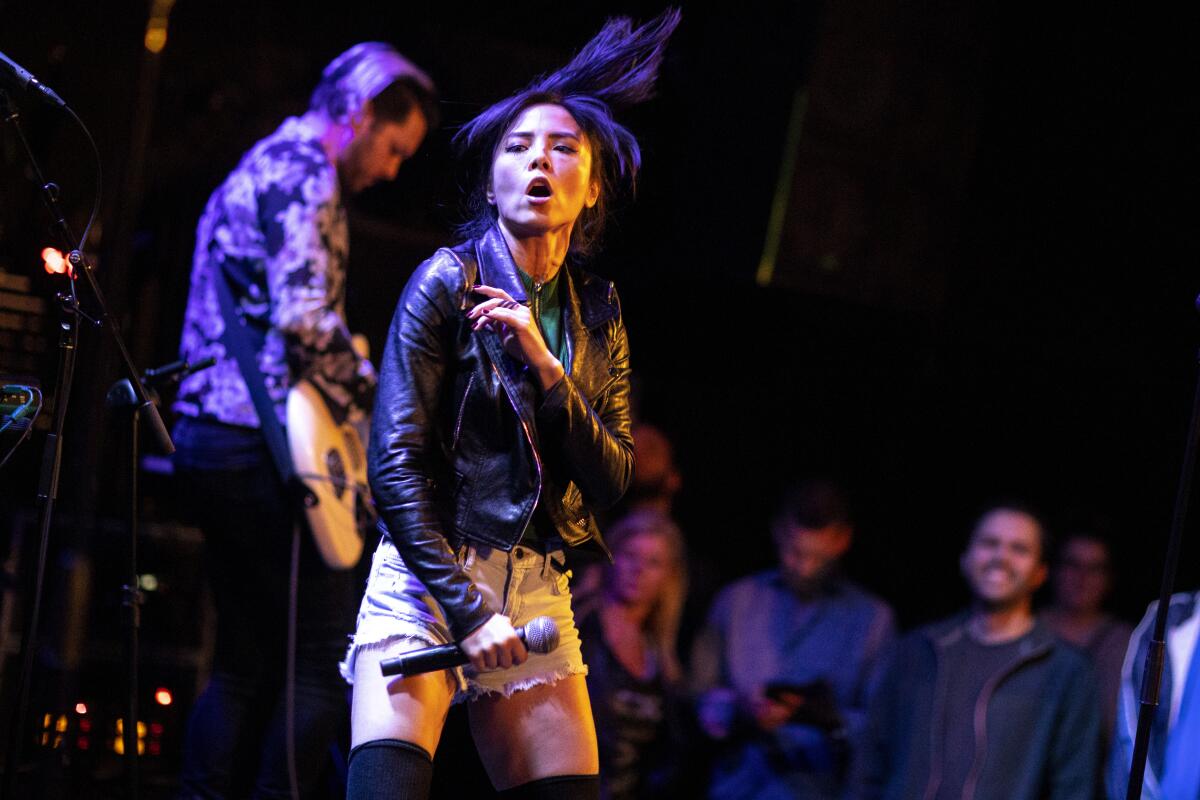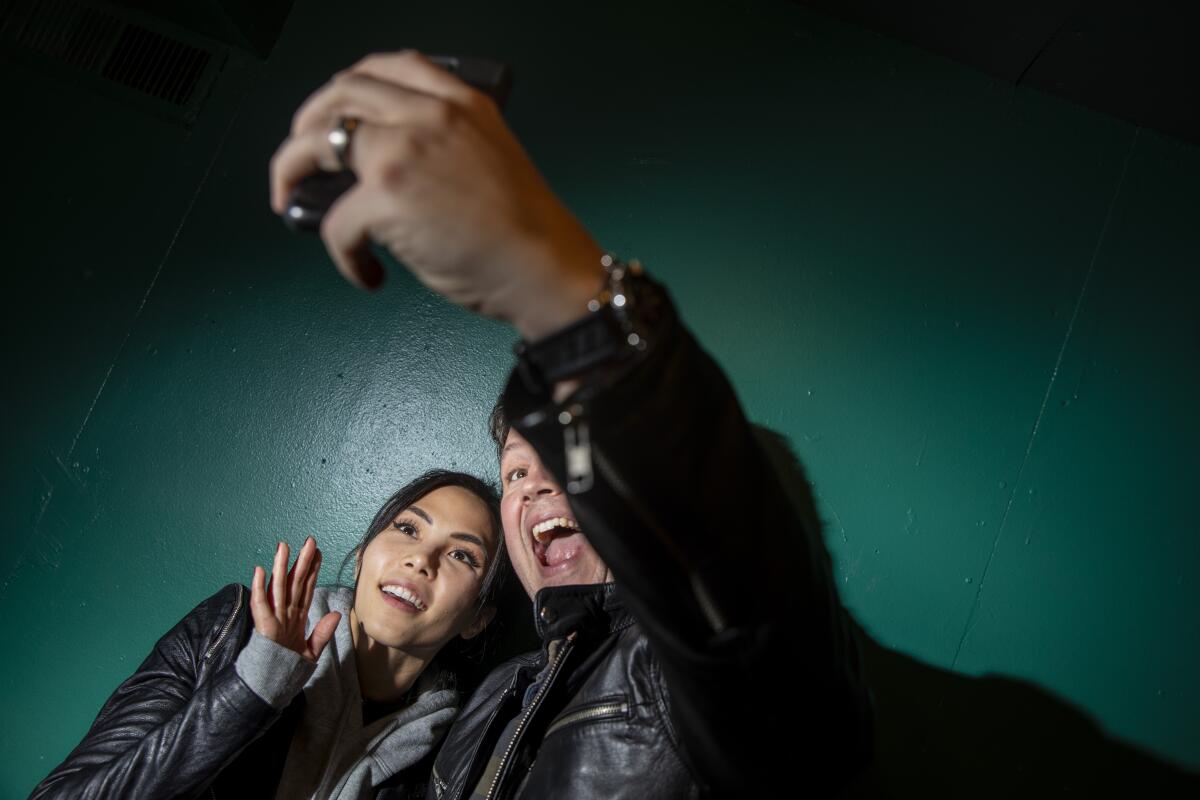Anna Akana is famously vulnerable. Now she’s revealing it all through music

- Share via
Anna Akana isn’t afraid to wear her heart on her sleeve. That is, after all, how she has become a thriving star with no creative limits.
For nearly a decade, Akana has laid out her battles with clinical depression, suicidal thoughts, toxic relationships and everything in between on YouTube for all to see.
But she doesn’t romanticize her mental-health struggles or exploit them for sympathy or her own professional gain, as some viewers have accused of her doing. Her intention is rather simple: She wants to destigmatize the way we talk about mental health.
“I think talking about difficult things gives you power over them. So instead of suffering in silence, which brews a lot of shame, being open about your difficulties allows you to connect with other people and helps you realize, like, we’re not so alone,” she said.

At 30, the L.A.-based artist has developed her identity as a mental-health advocate through many outlets, primarily YouTube, and keeps building her brand: comedian, actress, author, entrepreneur. And now, musician.
On Friday, Akana released her debut album, “Casualty,” a 13-track collection of confessional pop-rock, rap and spoken-word songs about the pains of being human — and using that suffering to grow.
“This album, this body of work is about overcoming different kinds of heartbreak,” she said in February at her home in Silver Lake. “So I do talk about suicide, depression, domestic abuse. There’s a lot of really sad stuff in it, like being a disappointment to yourself. I talk about my sobriety and my struggles with alcohol. Stuff like that.
“But it’s fun,” she joked.
Akana’s candid discussion of important topics — including abortion, the fetishization of Asian people (she is Japanese American) and coming out as bisexual — have drawn more than 2.6 million YouTube subscribers to her channel and millions more viewers to her videos since she started it eight years ago.

It’s easy to understand Akana’s appeal. She’s insightful and isn’t afraid to be vulnerable, to tell it like it is. She’s confident, clever and dissects tough topics with humor, using animation, cats and clones of herself, while always ensuring that her messages are clear. She imparts wisdom like a big sister would to a younger sibling. She makes viewers feel less alone.
“No one is that brutally honest just about themselves and what’s going on with them and wanting to talk about it,” said Kara Royster, Akana’s costar in YouTube Red’s Emmy-nominated “Youth & Consequences,” a comedy-drama series that Akana executive produced.
Her new album is merely the latest vehicle for her enlightened discourse on mental health, a topic she knows well. In 2017, Akana was in the throes of a dark depression. Therapy had stopped working, she was off her medication and she had a plan to kill herself.

Instead, she found hope and channeled her anguish the only way she’s ever known: through art.
Eleven years ago, music, acting and YouTube weren’t in Akana’s life plan. In fact, at 19, Akana hadn’t laughed for two years, she said. She was severely depressed. She was often high or drunk, dropping Molly or LSD to fill the void left by her little sister’s suicide in 2007.
From “Casualty,” the song “Selfish” begins with her sister’s death: “It broke my heart when my baby sis stepped off the toy chest,” she sings over a somber piano tune. Then, she veers into the times she’s felt hopeless, wanted to die and be selfish.

For two years after her sister’s suicide, the once ambitious, driven and goal-oriented Akana grappled with an existential crisis. Everything changed the day she saw Margaret Cho on Comedy Central.
“For the next 30 minutes, I forgot my sister was dead. I forgot that my family was [messed] up. I forgot who I was, how sad I was and how painfully hopeless life felt,” Akana wrote in an essay for Glamour last year.
She realized laughter could help her move on with her life.
So she dove head first into comedy, performing stand-up all over L.A. after she moved here from Temecula. But the chatty, nonchalant audiences and her stage anxiety motivated her shift to YouTube.
“I just want to put out something that people actually want to look at. I felt like I was walking around harassing people to listen to me and give me their time,” Akana said.
“With stand-up, I felt like I had worked out everything I wanted to work out, but I love live performance and I didn’t want to stop live performance,” she added. “So I was like, ‘Music feels like a very natural transition and a way to talk about more serious things in a platform where everyone can enjoy it.’ ”

With comedy on hold, Akana is now free to work on the multiple projects she’s often juggling.
In less than five years, she has co-hosted a podcast (Explain Things to Me) and co-created, directed and starred in a web series (“Miss 2059”). In February, she performed her first concert at the Roxy Theatre in West Hollywood. Her 2017 memoir, “So Much I Want to Tell You: Letters to My Little Sister,” is being developed by Warner Bros. into a TV series. And this year, she starred in her first feature film, “Go Back to China.”
“She was constantly working,” recalled Emily Ting, the film’s director. “In between takes, she was working on other projects, whether it’s approving edits for her short film ... or she’s dealing with her album … she’s honestly one of the most prolific people I’ve ever met.”

Akana can also be seen in the upcoming Netflix series “Jupiter’s Legacy,” based on a comic series, and “Let it Snow,” a romantic comedy adapted from a book by the same name. She’ll support Vivica A. Fox and Brittany Snow in the indie film “Bailey and Darla” later this year.
Her home — which she shares with four cats — is one of the few places of repose in her bustling life. She’s cultivated it into a space that inspires and makes her “feel things,” surrounded by plants and artwork.
The walls in her home office, once a pale “oppressive” blue, are now coated with an underwater hue. The tint serves a purpose: creativity. Akana has grapheme-color synesthesia, which means she associates specific colors with letters, numbers or words.

In her bedroom, she pointed to her favorite artwork: a black-and-white drawing by illustrator Henn Kim of a teenage girl, her back turned toward a dark background. She cradles a bouquet of lilies in her left arm, and her long hair is braided into a noose that stretches along her back.
“It reminds me of my sister so much,” she says.“I see it very much as that was my before and after sort of catalyst moment.”
Now that Akana has found her calling, she isn’t slowing down any time soon.
“I really love what I do, so it doesn’t feel like work,” she said. “Building things is exhausting, but even if I have two or three days in a row where I don’t have obligations, I go insane.”
More to Read
The biggest entertainment stories
Get our big stories about Hollywood, film, television, music, arts, culture and more right in your inbox as soon as they publish.
You may occasionally receive promotional content from the Los Angeles Times.










